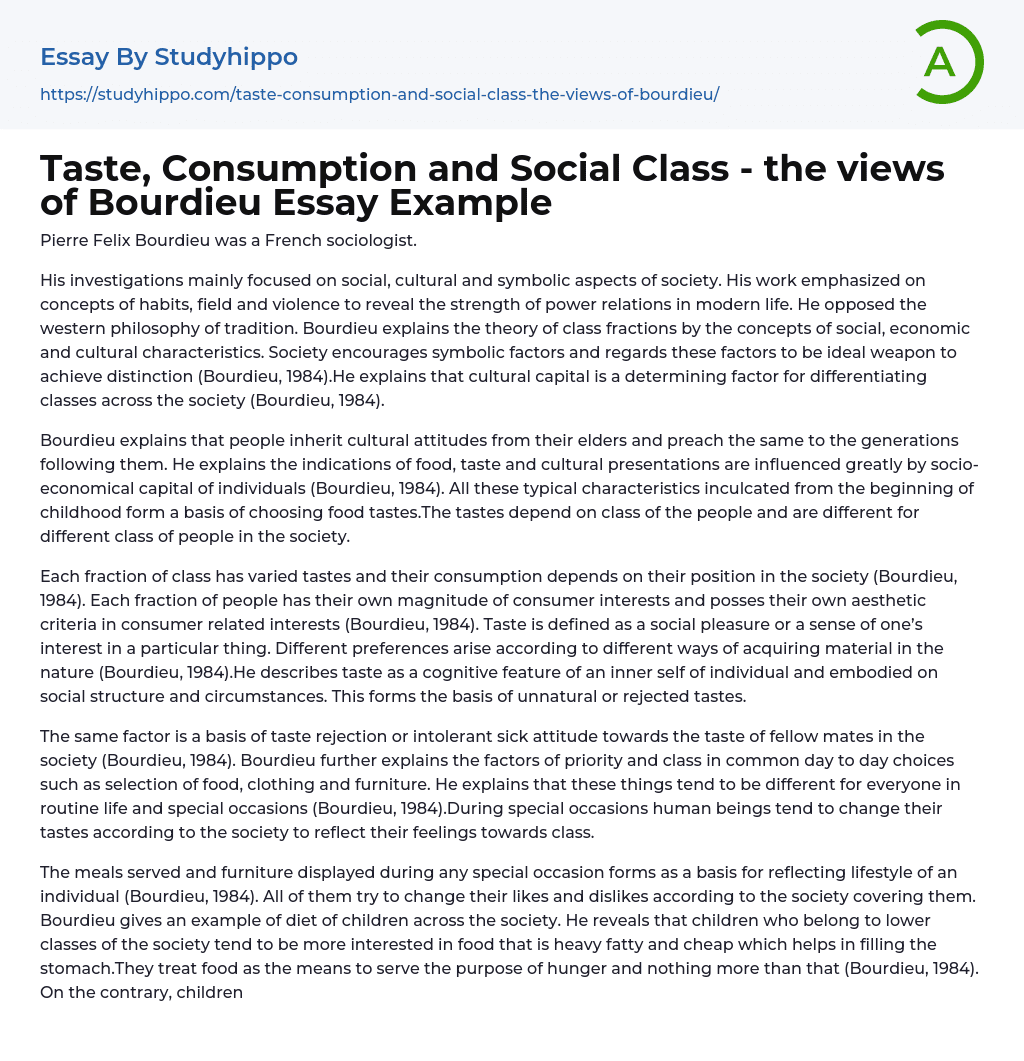

Taste, Consumption and Social Class – the views of Bourdieu Essay Example
Pierre Felix Bourdieu was a French sociologist.
His investigations mainly focused on social, cultural and symbolic aspects of society. His work emphasized on concepts of habits, field and violence to reveal the strength of power relations in modern life. He opposed the western philosophy of tradition. Bourdieu explains the theory of class fractions by the concepts of social, economic and cultural characteristics. Society encourages symbolic factors and regards these factors to be ideal weapon to achieve distinction (Bourdieu, 1984).He explains that cultural capital is a determining factor for differentiating classes across the society (Bourdieu, 1984).
Bourdieu explains that people inherit cultural attitudes from their elders and preach the same to the generations following them. He explains the indications of food, taste and cultural presentations are influenced greatly by socio-economical capital of indi
...viduals (Bourdieu, 1984). All these typical characteristics inculcated from the beginning of childhood form a basis of choosing food tastes.The tastes depend on class of the people and are different for different class of people in the society.
Each fraction of class has varied tastes and their consumption depends on their position in the society (Bourdieu, 1984). Each fraction of people has their own magnitude of consumer interests and posses their own aesthetic criteria in consumer related interests (Bourdieu, 1984). Taste is defined as a social pleasure or a sense of one’s interest in a particular thing. Different preferences arise according to different ways of acquiring material in the nature (Bourdieu, 1984).He describes taste as a cognitive feature of an inner self of individual and embodied on social structure and circumstances. This forms the basis of unnatural or rejected tastes.
The same factor i
a basis of taste rejection or intolerant sick attitude towards the taste of fellow mates in the society (Bourdieu, 1984). Bourdieu further explains the factors of priority and class in common day to day choices such as selection of food, clothing and furniture. He explains that these things tend to be different for everyone in routine life and special occasions (Bourdieu, 1984).During special occasions human beings tend to change their tastes according to the society to reflect their feelings towards class.
The meals served and furniture displayed during any special occasion forms as a basis for reflecting lifestyle of an individual (Bourdieu, 1984). All of them try to change their likes and dislikes according to the society covering them. Bourdieu gives an example of diet of children across the society. He reveals that children who belong to lower classes of the society tend to be more interested in food that is heavy fatty and cheap which helps in filling the stomach.They treat food as the means to serve the purpose of hunger and nothing more than that (Bourdieu, 1984). On the contrary, children of high class families are thought to eat original, exotic and nutritious food to fill their appetite.
People of higher classes focus more on health, built and nutrition of the body and inculcate slimming habit in their lifestyle (Bourdieu, 1984). This example demonstrates the difference of taste amongst children in different classes of society. While the poorer give importance to hunger, the richer give more priority to luxury.
- Food Safety essays
- Food Security essays
- Beverages essays
- Cuisines essays
- Dairy essays
- Desserts essays
- Fast Food essays
- Bread essays
- Meal essays
- Meat essays
- Organic Food essays
- Rice essays
- Sugar essays
- Taste essays
- Beef essays
- Coconut essays
- Crowd essays
- Dinner essays
- Juice essays
- Sainsbury essays
- Cooking essays
- Ginger essays
- Oreo essays
- Drink essays
- Beer essays
- Wine essays
- Coffee essays
- Tea essays
- Cake essays
- Hamburger essays
- Ice Cream essays
- Burger essays
- Pizza essays
- Fruit essays
- Lemon essays
- Food Waste essays
- Favorite Food essays
- Alcoholic essays
- Soft Drinks essays
- Cookie essays
- Starch essays
- Yeast essays
- Cola essays
- Pizza Hut essays
- snack foods essays
- chips essays
- Biscuit essays
- Brewing essays
- Brewery essays
- Child essays



